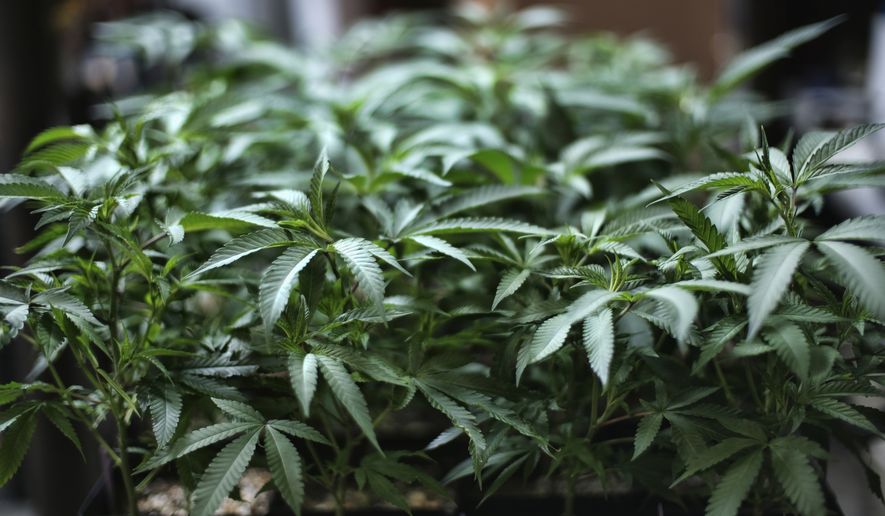The legal marijuana industry is thriving during the coronavirus lockdown, but the high times may not last.
“Pretty soon people aren’t going to be able to stay home and fire up a joint and watch ’The Price is Right,’” said Rudy, the proprietor of Huntington Beach Marijuana Delivery company, who declined to give his last name.
“But now there’s mass panic, mostly promoted by your industry, so I’m just going from one safe house to safe house to safe house,” Rudy told The Washington Times. “Right now it’s booming, but it won’t last. It’s only because people aren’t working.”
In an ocean of bad economic news, the marijuana industry, which is legal for recreational or medical uses in many states, is seeing a sales surge.
The industry’s lockdown boom comes on top of a 37% year-over-year growth last year, propelled by California and Massachusetts where sales topped $12.4 billion, according to BDSA, an analytics company that focuses on cannabis.
In California, where legal adult-use sales began in January 2018, BDSA found a 40% spike in daily sales over several days in March. In Illinois, where legal marijuana came on the market in January, the company estimated first-quarter sales of $188 million.
In Boulder, Colorado, sales dipped significantly when the University of Colorado closed its campus and shifted to online courses in March, said Sam Boilini, an assistant manager with Denver-based cannabis cultivator Verde Natural, which has a dispensary in Boulder.
“Well, this is a college town and you could see the difference,” Mr. Boilini said. “But overall we are seeing both new customers and our long-time customers are buying more.”
The economic shutdown rules “seem to change in the legislature every day,” Mr. Boilini joked.
The coronavirus rules limit Verde Natural to curbside pickup of online orders from a menu that ranges from Super Lemon Haze at $4.25 a gram to Cosmic Railway at $12.34 a gram.
California Gov. Gavin Newsom, a Democrat who was a big supporter of Proposition 64, the 2016 ballot initiative in which voters approved recreational pot, designated marijuana dispensaries as essential services when he shut down most other businesses March 19 to stop the spread of COVID-19.
He said dispensaries “protect the health and well-being of all Californians.”
That made perfect sense to Rudy, whose pot delivery business now gets busy starting at 8:30 a.m. instead of the 4 p.m. rush from before the shutdown.
“You’ve got high anxiety levels, and weed absolutely helps with anxiety,” he said. “And people know.”
Weed appears to be a so-called “recession-proof” industry like liquor, which also has seen strong sales during the widespread economic shutdowns triggered worldwide by the deadly coronavirus.
Anxiety is another reason people turn to the other side of cannabis: cannabidiol (CBD) oils and creams that don’t get users high but promise various health benefits such as relieving stress.
“We don’t know why it works, but it does, and it’s very obvious to me, anecdotally, how beneficial CBD and hemp oil can be,” said David Lonsdale, CEO of CanaFarma Corp., who acknowledged “medical science hasn’t quite caught up with that.”
In addition to relieving anxiety and stress, Mr. Lonsdale said cannabis-based products can ease nausea during chemotherapy and has antispasmodic properties to help those who have multiple sclerosis and other issues. While he stressed that CanaFarms “has nothing to do with ’marijuana,’” investors are currently high on CBD.
Indeed, Brightfield Group, a market research company, has issued reports predicting that soaring growth in the field that could lead to sales of $23.7 billion by 2023.
“We have seen a significant increase in sales and I don’t think it’s just a spike,” said Mr. Lonsdale, who declined to offer specific numbers.
Another positive for the industry in these dark coronavirus times is that marijuana and hemp are mainly produced by U.S. businesses.
CanaFarma grows its plants in upstate New York and will soon be cultivating weed in New Jersey, Mr. Lonsdale said.
Legit marijuana dealers must contend with competition from black market dealers who don’t have taxes or regulations, though they face criminal penalties.
Rudy said the illegal trade has not hurt his business. He has seen nothing but steady growth in his Huntington Beach outfit for the past 13 months.
“It all comes from the same farms, the barriers haven’t proved too much,” he said.
• James Varney can be reached at jvarney@washingtontimes.com.




Please read our comment policy before commenting.